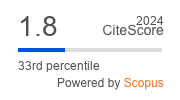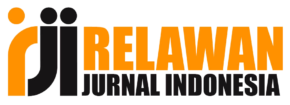Validitas dan Praktikalitas E-Modul Pelatihan Mikrotik Guru Teknik Komputer Jaringan
Abstract
The achievement of the Teacher Competency Test (UKG) results has not yet reached the expected percentage target. Based on the analysis, teachers need to increase their knowledge and skills about microtics. The module that is commonly used is a pdf format module that contains power point slides, the module does not have a more detailed description of the proxy use steps. This study aims to develop microtic training modules and reveal their validity and practicality. This type of research is development research using plomp and nieveen models, namely preliminary research, prototyping stage, and assessment phase. The instrument used was a questionnaire of validity and practicality. The results of the module validity test research by three module experts obtained results in the valid category. The validation of the material by three experts, the material was obtained with a valid category. Based on practicality tests by network computer engineering teachers at SMKN 2, SMKN 3, SMKN 5, SMKN 6 and SMKN 8 Padang shows that the module has a very high practicality category. Based on the results of the study, it can be concluded that the microtic training e-module is considered valid by experts as well as practical by instructors and trainees
Downloads
References
Dessler, G.. 2013. Human Resource Management. (fifteenth Edition). Florida International University : Pearson
Ivanceich M. John. 2013. Human Resource Management. Twelfth Edition. :McGrawHill
Noe, R.A., 2012. Human Resource Mangement : Gaining A Competitive Advantage.McGrawHill
Direktorat Pembina Sekolah Menengah Kejuruan. 2008. Petunjuk teknis pelaksanaan kurikulum tingkat satuan pendidikan. Jakarta. direktorat pembina sekolah mengengah kejuruan
E Mulyasa. 2015. Kurikulum Berbasis Kompetensi, Konsep Karakteristik Implementasi Dan Inovasi. Bandung : PT. Remaja Rosdakarya
Roza L Herdini, Ika, S.S., Teja P.P., 2018. Interactive E-Module Development through Chemistry Magazine on Kvisoft Flipbook Maker Application for Chemistry Learning in Second Semester at Second GradeSenior High School Jurnal Of Science Learning. 2 (1), 21-25 DOI: https://doi.org/10.17509/jsl.v2i1.12933
Sunismi dan Fathani 2016 Uji Validasi E-Module Matakuliah Kalkulus I untuk Mengoptimalkan Student Centered Learning dan Individual Learning Mahasiswa S-1. Jurnal Review Pembelajaran Matematika 1 (2), 174-191. https://doi.org/10.15642/jrpm.2016.1.2.174-191
Sugiyono. 2013. Metode Penelitian Kuantitatif, Kualitatif dan R&D. Bandung. Alfabeta
Ploomp Tjeerd & Nieveen Nienke. 2013. An Introduction to Educational Design Reseach. Neteherland. Enschede
Azwar. Saifuddin. 2013. Metode Penelitian . Yogyakarta: Pustaka Pelajar
Suharsimi Arikunto. 2010. Dasar-Dasar Evaluasi Pendidikan. Jakarta. Rineka Cipta
Riduwan. 2010. Belajar Mudah Penelitian Untuk Guru-Karyawan Dan Peneliti Pemula. Bandung. CV. Alfabeta
Imron Hamzah, Sriyani Mentari, 2016. Development of Accounting E-Module to Support the Scientific Approach of Students Grade X Vocational High School. Journal Of Accounting And Business Education, 2 (1), 78-88 DOI: http://dx.doi.org/10.26675/jabe.v1i1.9751
Copyright (c) 2019 Jurnal RESTI (Rekayasa Sistem dan Teknologi Informasi)

This work is licensed under a Creative Commons Attribution 4.0 International License.
Copyright in each article belongs to the author
- The author acknowledges that the RESTI Journal (System Engineering and Information Technology) is the first publisher to publish with a license Creative Commons Attribution 4.0 International License.
- Authors can enter writing separately, arrange the non-exclusive distribution of manuscripts that have been published in this journal into other versions (eg sent to the author's institutional repository, publication in a book, etc.), by acknowledging that the manuscript has been published for the first time in the RESTI (Rekayasa Sistem dan Teknologi Informasi) journal ;








